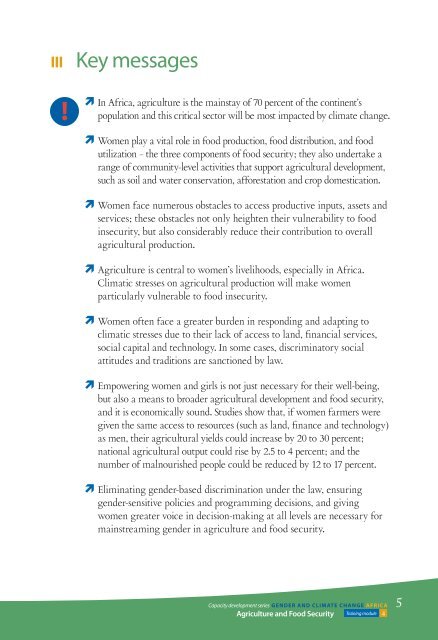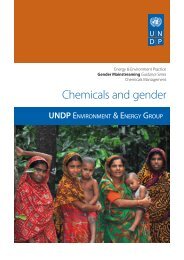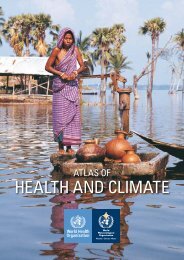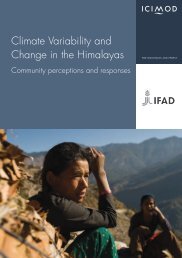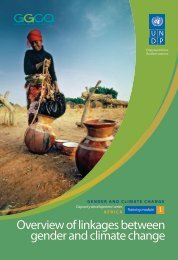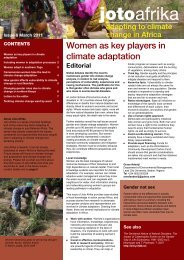Module 4: Gender, Agriculture and Food Security - Gender Climate
Module 4: Gender, Agriculture and Food Security - Gender Climate
Module 4: Gender, Agriculture and Food Security - Gender Climate
- No tags were found...
You also want an ePaper? Increase the reach of your titles
YUMPU automatically turns print PDFs into web optimized ePapers that Google loves.
III<br />
Key messages<br />
ÒÒIn Africa, agriculture is the mainstay of 70 percent of the continent’s<br />
population <strong>and</strong> this critical sector will be most impacted by climate change.<br />
ÒÒWomen play a vital role in food production, food distribution, <strong>and</strong> food<br />
utilization – the three components of food security; they also undertake a<br />
range of community-level activities that support agricultural development,<br />
such as soil <strong>and</strong> water conservation, afforestation <strong>and</strong> crop domestication.<br />
ÒÒWomen face numerous obstacles to access productive inputs, assets <strong>and</strong><br />
services; these obstacles not only heighten their vulnerability to food<br />
insecurity, but also considerably reduce their contribution to overall<br />
agricultural production.<br />
ÒÒ<strong>Agriculture</strong> is central to women’s livelihoods, especially in Africa.<br />
Climatic stresses on agricultural production will make women<br />
particularly vulnerable to food insecurity.<br />
ÒÒWomen often face a greater burden in responding <strong>and</strong> adapting to<br />
climatic stresses due to their lack of access to l<strong>and</strong>, financial services,<br />
social capital <strong>and</strong> technology. In some cases, discriminatory social<br />
attitudes <strong>and</strong> traditions are sanctioned by law.<br />
ÒÒEmpowering women <strong>and</strong> girls is not just necessary for their well-being,<br />
but also a means to broader agricultural development <strong>and</strong> food security,<br />
<strong>and</strong> it is economically sound. Studies show that, if women farmers were<br />
given the same access to resources (such as l<strong>and</strong>, finance <strong>and</strong> technology)<br />
as men, their agricultural yields could increase by 20 to 30 percent;<br />
national agricultural output could rise by 2.5 to 4 percent; <strong>and</strong> the<br />
number of malnourished people could be reduced by 12 to 17 percent.<br />
ÒÒEliminating gender-based discrimination under the law, ensuring<br />
gender-sensitive policies <strong>and</strong> programming decisions, <strong>and</strong> giving<br />
women greater voice in decision-making at all levels are necessary for<br />
mainstreaming gender in agriculture <strong>and</strong> food security.<br />
Capacity development series <strong>Gender</strong> <strong>and</strong> <strong>Climate</strong> Change Afric a<br />
<strong>Agriculture</strong> <strong>and</strong> <strong>Food</strong> <strong>Security</strong> Training module 4<br />
5


